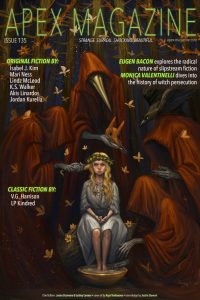Gary K. Wolfe Reviews The Collapsing Frontier by Jonathan Lethem
 The Collapsing Frontier, Jonathan Lethem (PM Press 978-1-62963-488-3, $16.00, 160pp, tp) March 2024.
The Collapsing Frontier, Jonathan Lethem (PM Press 978-1-62963-488-3, $16.00, 160pp, tp) March 2024.
With all the much-deserved tributes to the late Terry Bisson and his work (which included a long-running and very funny column for this magazine), it’s easy to overlook the brilliant series of author chapbooks he edited for PM Press for the past 15 years. A virtual who’s who of our field, it has included authors such as Le Guin, Moorcock, Delany, Hopkinson, Kim Stanley Robinson, Elizabeth Hand, John Crowley, Karen Joy Fowler, and many others. Jonathan Lethem’s The Collapsing Frontier is the thirtieth in the series (though apparently not the last; a couple are still in the pipeline). As with earlier volumes, it’s a combination of non-fiction and fiction (some original), topped off with a breezy and unconventional interview with Bisson. In Lethem’s case, this means a longish review-essay of Edward Snowden’s Permanent Record, a memoir of Lethem’s odd relationship with the late novelist Richard Bowman and the “Furry-Girl School of American Fiction” (which is not what you think it is), essays on Stanislaw Lem and Italo Calvino, a New Yorker story heavily indebted to R.A. Lafferty, and an original story, “In Mugwump Four”, a satirical and somewhat whimsical critique of immersive online VR environments.
Lethem seems like an almost inevitable candidate for the series. Discussions of his work often seem to devolve into the question of whether he’s an SF writer abducted by literature, or a literary writer kidnapped by SF. The answer, of course – as evidenced repeatedly by this volume – is that it’s a silly question. There’s little doubt that SF has long been one of the touchpoints of Lethem’s reading; even his review of Snowden’s memoir is replete with allusions to Sheckley, Dick, Lovecraft, and Galaxy magazine, and his insightful essay on Lem (the longest piece in the book) includes a pretty accurate discussion of hard SF and reveals that Lethem is not only familiar with the literature, but with its academic and critical scholarship as well. His original story “In Mugwump Four” includes lines like “The sky above my house was the color of a ’404 page not found’ error message,” and the other story, “The Collapsing Frontier” (which originally appeared in The New Yorker as “Narrowing Valley”), not only directly alludes to Lafferty’s “Narrow Valley”, but cites its original appearance in a 1973 Robert Silverberg anthology. The tale itself is a metafictional delight in which the story being written is also one of the main characters (the changed title alludes to the historian Frederick Jackson Turner, whose thesis about the frontier provides the central theme).
But Lethem makes it clear throughout, including in his interview with Bisson, that his literary landscape is also made up of authors such as Kafka and Borges, Raymond Chandler and Patricia Highsmith, Anna Kavan and John Ashbery – not to mention Jack Kirby comics, Talking Heads music, and Godard films. What one comes away with is a vivid portrait of a voracious reader and sharp-eyed culture consumer, born in the 1960s, who never learned to compartmentalize his interests or join a camp. “Sometimes I see people breaking me into two halves,” he complains to Bisson, “as if after The Fortress of Solitude I became somebody other than myself.” It’s a legitimate complaint, not only for Lethem, but for an increasing number of writers and artists who simply never cared where the fences were supposed to be. What finally emerges is a voice which is consistently engaging, sometimes self-effacing, occasionally performative, and always stimulating. The Collapsing Frontier is no substitute for reading Lethem’s wide-ranging novels and essays, but it situates them in a context that’s nothing short of illuminating.
Gary K. Wolfe is Emeritus Professor of Humanities at Roosevelt University and a reviewer for Locus magazine since 1991. His reviews have been collected in Soundings (BSFA Award 2006; Hugo nominee), Bearings (Hugo nominee 2011), and Sightings (2011), and his Evaporating Genres: Essays on Fantastic Literature (Wesleyan) received the Locus Award in 2012. Earlier books include The Known and the Unknown: The Iconography of Science Fiction (Eaton Award, 1981), Harlan Ellison: The Edge of Forever (with Ellen Weil, 2002), and David Lindsay (1982). For the Library of America, he edited American Science Fiction: Nine Classic Novels of the 1950s in 2012, and a similar set for the 1960s. He has received the Pilgrim Award from the Science Fiction Research Association, the Distinguished Scholarship Award from the International Association for the Fantastic in the Arts, and a Special World Fantasy Award for criticism. His 24-lecture series How Great Science Fiction Works appeared from The Great Courses in 2016. He has received six Hugo nominations, two for his reviews collections and four for The Coode Street Podcast, which he has co-hosted with Jonathan Strahan for more than 300 episodes. He lives in Chicago.
This review and more like it in the July 2024 issue of Locus.
 While you are here, please take a moment to support Locus with a one-time or recurring donation. We rely on reader donations to keep the magazine and site going, and would like to keep the site paywall free, but WE NEED YOUR FINANCIAL SUPPORT to continue quality coverage of the science fiction and fantasy field.
While you are here, please take a moment to support Locus with a one-time or recurring donation. We rely on reader donations to keep the magazine and site going, and would like to keep the site paywall free, but WE NEED YOUR FINANCIAL SUPPORT to continue quality coverage of the science fiction and fantasy field.
©Locus Magazine. Copyrighted material may not be republished without permission of LSFF.








Gary K. Wolfe and Johnathan Lethem are mistaken — R.A. Lafferty’s “Narrow Valley” first appeared in F&SF in 1967.